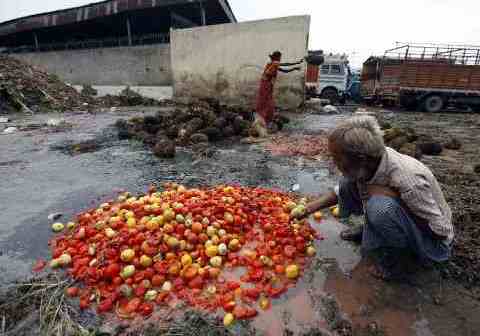ICTpost Bureau
The amount of food wasted and lost around the world is staggering in India. This is food that could be used to feed the India’s growing population as well as those in hunger today. It is also an unnecessary waste of the land, water and energy resources that were used in the production, processing and distribution of this food.
The reasons for this situation range from poor engineering and agricultural practices, inadequate transport and storage infrastructure through to supermarkets demanding cosmetically perfect foodstuffs and encouraging consumers to overbuy through buy-one-get-one free offers. India’s poor harvesting methods coupled with inadequate storage and distribution system contribute significantly to the food wastage globally.
A report by the Institution of Mechanical Engineers has found that as much as 50% of all food produced around the world never reaches a human stomach due to issues as varied as inadequate infrastructure and storage facilities through to overly strict sell-by dates, buy-one-get-one free offers and consumers demanding cosmetically perfect food.
With UN predictions that there could be about an extra three billion people to feed by the end of the century and an increasing pressure on the resources needed to produce food, including land, water and energy, the Institution is calling for urgent action to tackle this waste.
The report Global Food; Waste Not, Want Not found that:
between 30% and 50% or 1.2-2 billion tonnes of food produced around the world each year never reaches a human stomach;
about 550 billion m3 of water is wasted globally in growing crops that never reach the consumer;
it takes 20-50 times the amount of water to produce 1 kilogram of meat than 1 kilogram of vegetables;
the demand for water in food production could reach 1013 trillion m3 a year by 2050. This is 2.5 to 3.5 times greater than the total human use of fresh water today and could lead to more dangerous water shortages around the world;
there is the potential to provide 60-100% more food by eliminating losses and waste while at the same time freeing up land, energy and water resources.
In India, 20 million tonnes of wheat is lost annually due to poor harvesting and inadequate infrastructure. This loss can be reduced by mechanical handling in field, gutters on buildings, sealing cracks and holes to stop rodents, installing temperature control for perishable products and standardised transport crates. If we are able to curb this loss, it would add about $100 billion to the Indian economy.
As water, land and energy resources come under increasing pressure from competing human demands, engineers have a crucial role to play in preventing food loss and waste by developing more efficient ways of growing, transporting and storing foods.
But in order for this to happen Governments, development agencies and organisation like the UN must work together to help change people’s mindsets on waste and discourage wasteful practices by farmers, food producers, supermarkets and consumers.
By 2075 the UN predicts that the world’s population is set to reach around 9.5 billion, which could mean an extra three billion mouths to feed. A key issue to dealing with this population growth is how to produce more food in a world with resources under competing pressures particularly given the added stresses caused by global warming and the increasing popularity of eating meat which requires around 10 times the land resources of food like rice or potatoes. editor@ictpost.com








